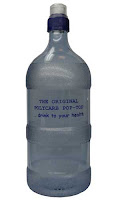
Here are a few facts that we at Down To Earth Organics having been digging up for the last few months that may give some the motivation to make their lives just that little bit greener:
- One polystyrene cup contains as many as 1 billion molecules of CFC's.
- Every minute we are pumping 16000kgs of sewage into our oceans, worldwide.
- Every year roughly 100,000, marine mammals, 1,000,000 birds and 50,000 seals are killed by floating plastic.
- Amazingly, 25 billion polystyrene cups and 2.5 million plastic bottles are thrown away every hour.
- 85% of household rubbish can be recycled.
- If one famous London paper used recycled paper on one printing run , on any day, it would save 70,000 trees.
- It takes 100 years for a plastic bag to decompose.
- 40,000,000 acres of lush tropical rain forest are being destroyed through logging every year.














